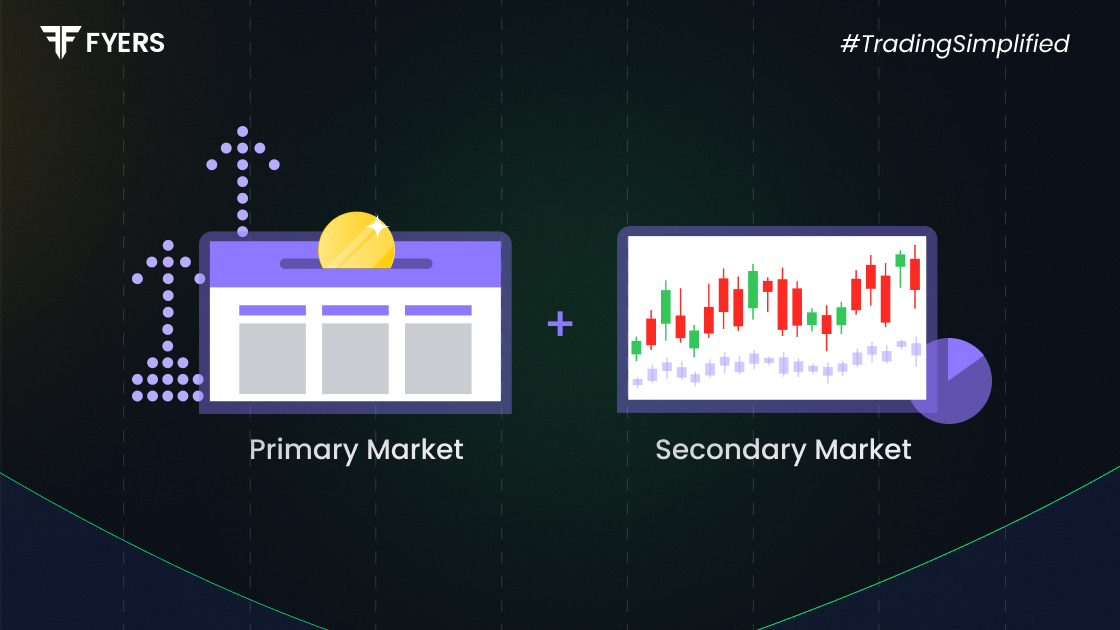

 19 Jun, 2025
19 Jun, 2025
 4 mins read
4 mins read

You’ve probably heard the term “capital market” thrown around when people talk about investing, stock prices, or even government borrowing. But what is a capital market, really? Why does it matter, and how does it affect the average investor or the economy at large?
This guide breaks it all down - from the capital market definition to its functions, types, participants, and real-world examples. Whether you're an aspiring investor or just curious about how money moves in the economy, this is your one-stop explainer.
A capital market is a marketplace where buyers and sellers trade long-term financial instruments like shares, bonds, and debentures. Unlike the money market which deals with short-term borrowing (usually under a year), capital markets are where long-term money is raised and invested.
Simply put, if a company wants to expand its operations or a government wants to fund infrastructure projects, they often turn to the capital market to raise that money.
So, the capital market definition is - a financial system that helps channel savings and investments between suppliers of capital (like investors) and those who need capital (like businesses and governments).
Capital markets function through the interaction of supply and demand for funds:
Trades take place on organised platforms like stock exchanges or through over-the-counter (OTC) deals. Prices are driven by market forces and regulated by government bodies to ensure transparency and fairness.
Here's how a basic transaction works:
Capital markets are broadly classified into two types:
|
Type of Market |
Description |
|---|---|
|
Primary Market |
Where new securities are issued for the first time (e.g., IPOs). |
|
Secondary Market |
Where existing securities are bought and sold (e.g., NSE, BSE). |
Both types are essential. The primary market fuels business growth, while the secondary market keeps the system liquid and attractive for investors.
1. Capital Formation
It helps businesses and governments raise money for long-term projects.
2. Investment Avenues
Investors can grow their money through shares, bonds, mutual funds, etc.
3. Liquidity
Thanks to the secondary market, investors can buy and sell easily whenever they need to.
4. Price Discovery
Securities are priced by supply and demand, reflecting real-time market sentiment.
5. Efficient Allocation of Resources
Funds move from savers to entities that can use them productively - like a tech company launching a new product or a government building roads.
In short, the role of capital market in the economy is huge. It supports growth, creates jobs, and keeps the financial system ticking.
The capital market ecosystem includes a range of players:
Retail and Institutional Investors: Individuals, mutual funds, pension funds, etc.
Issuers: Companies or governments raising funds.
Intermediaries: Brokers, underwriters, depositories, and investment banks. These are the middlemen - stockbrokers, underwriters, depositories, and investment banks - who facilitate transactions
Regulators: SEBI (Securities and Exchange Board of India) ensures compliance and transparency.
Capital markets offer various instruments catering to different investment needs:
|
Instrument |
Nature What It Is |
Who Uses It |
|---|---|---|
|
Equity Shares |
Ownership in a company |
Investors, Companies |
|
Debentures/Bonds |
Debt instruments |
Governments, Corporates |
|
Preference Shares |
Hybrid securities |
Risk-averse investors needing fixed income |
|
Derivatives |
Futures, Options |
Traders, Hedgers |
|
Mutual Funds |
Pooled investment schemes |
Retail investors |
Say Infosys Ltd launches a public issue of shares through an IPO. This is the primary market in action - investors apply, and Infosys raises fresh funds.
Once those shares are listed on the NSE, you can buy or sell them just like you would a product on Amazon. This ongoing trading is what happens in the secondary market.
Another example of capital market? Government bonds listed on the BSE. Banks, mutual funds, and even individuals can buy these as a low-risk investment option.
These examples show how capital markets work in practice - bridging the gap between capital seekers and investors.
Capital markets are more than just trading floors or tickers scrolling on financial news channels. They are the engines of growth for companies, the bridge between savings and investment, and a vital part of any economy.
From understanding what is capital market to knowing the types of capital markets, their functions, and the capital market participants involved, you're now better equipped to grasp how these systems support wealth creation and development.
A capital market is a place where people and institutions trade long-term securities like stocks and bonds to raise or invest money.
A capital market deals with long-term securities, while a money market focuses on short-term financial instruments with maturities less than one year.
In India, the capital market is regulated by SEBI (Securities and Exchange Board of India), which ensures fair practices and protects investor interests.
Capital markets mobilise savings, support industrial and infrastructure development, facilitate capital formation, and help in price discovery—all of which contribute to economic growth.
Calculate your Net P&L after deducting all the charges like Tax, Brokerage, etc.
Find your required margin.
Calculate the average price you paid for a stock and determine your total cost.
Estimate your investment growth. Calculate potential returns on one-time investments.
Forecast your investment returns. Understand potential growth with regular contributions.